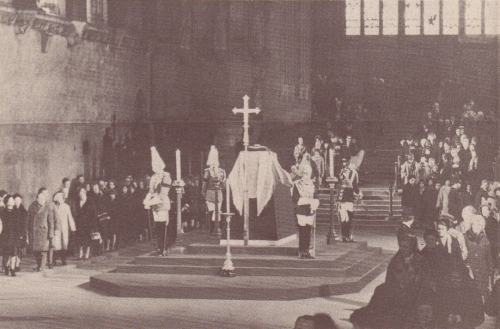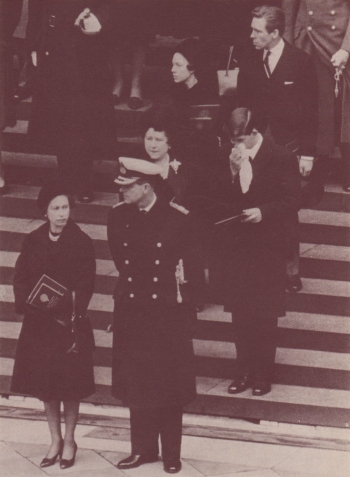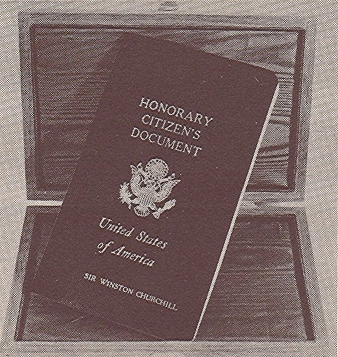Never before in the history of the world have so many felt so indebted to one man — Sir Winston Churchill.
No funeral was ever attended by so many dignitaries.
Many now realize the last of the World's truly great has passed into history.
But few understand its prophetic significance for Britain's future.
"CHURCHILL IS DEAD!" The world bowed in silence as those three significant words echoed around the earth on Sunday, the 24th of January.
Churchill, at ninety, had lived a long and full life. He was blessed by seeing his great-grandchildren. As of the patriarch Abraham, it could also be said Sir Winston "gave up the ghost and died in a good old age, an old man, and full of years; and was gathered to his people" (Gen. 25:8).
Fifteen years ago, on Mr. Churchill's seventy-fifth birthday, he was asked if he had any fear of death. "I am ready to meet my Maker. Whether my Maker is prepared for the great ordeal of meeting me is another matter," quipped Churchill.
Shortly before Sir Winston's death, he sat gazing intently into a log fire. "I know what it's like to be a log: reluctant to be consumed, but yielding in the end to persuasion," he mused.
Some Wept Openly
After lying in a coma for nine long days, while a grieved world kept vigil, the ninety-year-old, lion-hearted warrior finally surrendered to his last enemy — death. The plucky old warrior, unconscious, had given up the struggle. Instantly all the turmoil and battle of his 90 years was over.
Condolences poured into Britain. Presidents, prime ministers, kings, heads of state, religious dignitaries and countless others from 111 nations — all expressed their sincere regret at the loss which Britain had suffered.
Here in Britain, the sense of bereavement was very evident. The usual mask — behind which so many Britons characteristically hide their emotions — fell away. Some wept openly.
|
Flags were lowered to half-mast not only in Britain and the Commonwealth nations, but also in the United States.
The Government arranged a State funeral for Sir Winston Churchill — an honor shared only by one or two commoners during the whole of Britain's proud history.
On Wednesday, January 27, Sir Winston's body was taken to Westminster Hall where it lay in state until Saturday so that hundreds of thousands of Britons could pay their final tribute to the man who had inspired them to victory in World War II. At times people were queued up four abreast for over a mile. My wife and I, on behalf of Ambassador College, were privileged to pay our respects in memory of Sir Winston Churchill as he lay in West minster Hall. God commands us to show "honor to whom honor" is due (Rom. 13:7). "Honor all men. . . . Honor the king" (I Pet. 2:17). Churchill was greater than any king of his era.
The final funeral services were held in London's jam-packed St. Paul's Cathedral. Nearly 400,000,000 people viewed the funeral services as they were relayed to the world via Telstar.
|
Wide World Photo

Two lines of mourners file past casket and catafalque in Westminster Hall,
paying homage to Sir Winston Churchill as he lies in state.
|
An estimated half-million people stood shivering in the bitter east wind as the funeral cortege made its way from Westminster Hall to St. Paul's Cathedral, then on to Tower Pier. There the coffin was placed onto a motor launch and taken up the River Thames to the Waterloo train station. From there it was taken by train to the Oxfordshire village of Bladon where the final burial took place. Thus ended the final journey of the man who has been variously called "The greatest Englishman of all time," "the man of the century," "a man of destiny."
But what made Churchill great? What prophetic significance does his death have for Britain — and the world?
|
Why Churchill Was Great
Britons honored Sir Winston Churchill by giving him a State burial. It was the first in which a ruling Sovereign ever attended the funeral of a commoner. What called forth this honor?
Certainly one of the reasons was his tireless, outspoken defense of freedom against all tyrannies — especially Naziism and Communism. He put principle above politics. He saw despots as they were. Before others recognized the international threat to peace, he eloquently spoke out against such tyrants as Hitler and Mussolini.
The Scripture says, "He that saith unto the wicked, thou art righteous; him shall the people curse, and nations shall abhor him" — these are the appeasers, of whom we have many today. ". . . but to them that rebuke him shall be delight, and a good blessing shall come upon them" (Prov. 24:24-25).
This Scripture was actually fulfilled in the life of Sir Winston Churchill. He sounded the alarm against the wicked Hitler and Stalin. When the storm clouds of World War II began to loom black and ominous over Europe, Churchill trumpeted numerous warnings in the House of Commons. Nobody paid any attention to the "Blenheim Rat," as his enemies called him. At that time, there were men in influential positions both in Britain and on the Continent who didn't think Hitler and Mussolini were such bad fellows after all. Britain's pre-World War II Prime Minister Neville Chamberlain had even been deluded by the scheming Hitler into signing the Munich Pact in 1938. Upon his return to Britain he waved this signed agreement explaining that it brought "Peace with honor . . . peace in our time." He had been politicking and, having disregarded principle, had sold out the Czechs to Hitler.
But Churchill was bitterly outspoken. His was the only voice in the political wilderness of those days — crying out against the Munich Agreement of 1938. He shouted: "We have sustained a total and unmitigated defeat . . . This is only the first sip, the first foretaste of a bitter cup which will be proffered to us year by year, unless, by supreme recovery of moral health and martial vigor, we arise again and take our stand for freedom as in the olden time."
|
Wide World Photo

The royal family broke age-old tradition to honor
Sir Winston Churchill by attending his funeral — the first
time British royalty had attended the funeral of a commoner.
Shown above, immediately after the funeral, in the forecourt
of St. Paul's Cathedral are Queen Elizabeth with her husband
Prince Philip and, behind them, The Queen Mother and
Prince Charles.Then Princess Margaret and her husband
the Earl of Snowdon.
|
Corporal Hitler — "A Maniac"
Churchill knew Corporal Hitler was a madman. He referred to him often as "a maniac of ferocious genius."
When Hitler carried his murderous carnage throughout Europe, it soon became clear that Churchill had been right after all. Hitler was bent on hellish destruction — the conquest, if possible, of the whole world.
Prime Minister Neville Chamberlain had been wrong. As the Nazi avalanche raced toward the English Channel and toward Britain, Parliament finally woke up and dismissed its Prime Minister of Appeasement, Chamberlain. King George VI, in May, 1940, asked Churchill to form a new Government.
"Walking with Destiny"
|
It was on the 10th May, 1940. Almost exactly the same time Germany launched her blitzkrieg invasion of France and the Low Countries. Mr. Churchill, now Prime Minister, rose to meet the crisis. He later wrote of that day: "Thus, on the night of the 10th May, I acquired the chief power in the State . . . I took it all as it came, but I cannot conceal . . . that as I went to bed at about 3 a.m., I was conscious of a profound sense of relief. At last I had the authority to give directions over the whole scene. I felt as if I were walking with Destiny, and that all my past life had been but a preparation for this hour and for this trial . . . I was sure I should not fail."
From the outset, Churchill bluntly announced the sailing would not be easy. He made this crystal clear in his maiden speech as Prime Minister in the House of Commons in May, 1940. "I would say to the House, as I have said to those who have joined this Government: 'I have nothing to offer but blood, toil, tears and sweat.' . . . You ask: 'What is our policy?' I will say: 'It is to wage war by sea, land, and air with all our might, and with all the strength that God can give us; to wage war against a monstrous tyranny, never surpassed in the dark, lamentable catalogue of human crime.' You ask: 'What is our aim?' I can answer in one word: 'Victory! Victory at all costs, victory in spite of all terror, victory however long and hard the road may be: FOR WITHOUT VICTORY THERE IS NO SURVIVAL.' "
It was with such rousing speeches as these that Churchill fired the hearts of Britons and of free peoples throughout the whole world. There were many weak-kneed people in the world in those days. There are today. The world needed a lion-hearted leader to inspire them with confidence. Churchill was the man whom God had sent for the job. Where is such a leader today?
But what of the deadly perils which Britain faced when Churchill became Prime Minister in May, 1940? How did Sir Winston meet them?
|
Wide World Photo

The American passport which was presented to Sir Winston
Churchill April 10, 1963, after U.S. Congress passed a bill
making him an honorary citizen of the United States.
Sir Winston called this an honor "without parallel."
|